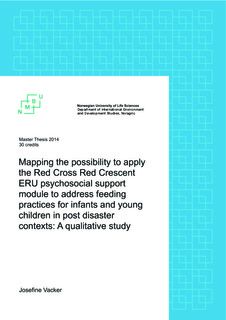Mapping the possibility to apply the Red Cross Red Crescent ERU psychosocial support module to address feeding practices for infants and young children in post disaster contexts: A qualitative study
Master thesis
Permanent lenke
http://hdl.handle.net/11250/217394Utgivelsesdato
2014-08-18Metadata
Vis full innførselSamlinger
Sammendrag
Background: Child undernutrition constitutes a major global public health challenge to children's chances of physical and cognitive development and survival. Disasters affect millions of people every year and have devastating impacts in the lives of those affected. Caregivers capabilities to care for, and feed their infants and young children, may be disrupted due to changes in the environment and psychosocial challenges. The Red Cross Red Crescent ERU - psychosocial support module have recently been identified to have a potential to address feeding practices for infants and young children in post disaster contexts. The objective of this master thesis is to map professionals’ perceptions and perspectives of how to possibly apply the psychosocial support module to address infant and young child feeding practices in future ERU deployments.
Theoretical framework: The chosen theoretical framework function as an analytical and interpretative tool to understand and add meaning to the informants’ expressions and perceptions. A biocultural perspective of human diet and nutrition, deriving from anthropology and epidemiology, were chosen as the overall theoretical view. The theoretical descriptions of psychosocial support [PSS] and infant and young child feeding [IYCF] will function as applied theory, where the concept of Baby Tents is exemplified as an activity combining PSS and IYCF.
Method: An ethnographic research perspective with an inductive qualitative study design, using semi-structured interviews was chosen to explore the perspectives of 15 key professionals experienced in PSS, IYCF, Baby Tents and humanitarian disaster response. Systematising, coding and categorising the audio-recorded interviews resulted in five main categories; divided into four stages and one overarching dimension. The analytical interpretation of the study findings in light of the theoretical framework was guided by a hermeneutic approach.
Findings: The study findings disclosed several perspectives of how to possibly apply the psychosocial support module to address feeding practices for infants and young children in future ERU deployments. Stage 1 is about how psychosocial support delegates, prior to deployment, may be prepared to address feeding practices in post disaster contexts. Stage 2 highlights how psychosocial support may be applied to understand existing feeding practices. In stage 3, it is presented how psychosocial support activities may be designed to support feeding practices in post disaster contexts. Effects and means to make the activities sustain and have positive public health outcomes are discussed in chapter 4. The overarching dimension 5 is related to stage 1-4, and presents the perceived role of local Red Cross Red Crescent community volunteers as the link between the psychosocial support delegates and disaster affected communities and individuals.
Conclusion: The presented study findings highlights some prominent aspects, which may be perceived as a starting point to further discuss its practical implication in future ERU deployments. The Red Cross Red Crescent Movement Disaster Response management is recommended to consider how to possibly implement the study findings in practice, and furthermore evaluate its applicability continuously.
Keywords: Baby Tents, Child undernutrition, Disaster response, Emergency Response Unit, Infant and Young Child Feeding, International Federation of Red Cross Red Crescent, Psychosocial Support, Psychosocial Support Module
